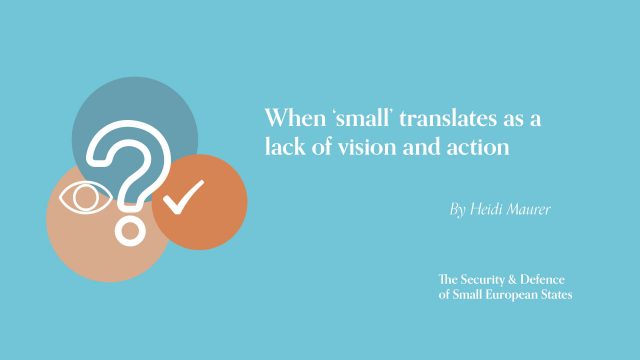When ‛small’ translates as a lack of vision and action
Author: Heidi Maurer
European security and defence has gained increased momentum over the past two years. When Permanent Structured Cooperation (PESCO) in defence was launched in December 2017, the President of the European Commission, Jean-Claude Juncker, triggered further debate surrounding the creation of a ‘European army’ just as US President Donald Trump was criticising his NATO allies for not shouldering enough defence spending. Over the past two years there has been lots of talk about NATO Members increasing their defence spending to the Alliance’s official target of 2% of GDP and Europeans are at least talking and taking responsibility for their security. But has anything, in political and capability terms, really changed?
Too much smoke, too little fire?
EU Member States have been busy in Brussels: there is now a roadmap for PESCO, there were several Council stock-taking exercises over the past two years, and a total of 47 PESCO projects were launched. Additionally, hybrid threats and cybersecurity frequently featured as issues on the Council’s agenda.
Lots of activity, lots of talking, but to what end? Already in 1977, David Allen and William Wallace criticised the weakness of the forerunner of today´s EU foreign and security policy (European Political Cooperation) as being distracted with too much attention focused on “procedure as substitute for substance”. With the amount of current output activity in policy coordination and planning, the question remains when and what outcomes are meant to be achieved? Or is history simply repeating itself in European security and defence cooperation?
European foreign, security and defence policy has always been dependent on EU Member States ́ support and ownership. But how many of the 27 Member States have actively adapted their defence and security approaches in the past 20 years?
Much “business as usual” in security and defence thinking
There are exceptions but for the majority of EU Member States, it is business as usual. Governments tend to default to what was previously done. New governments bring new personalities and policy priorities, but citizens do not really select their leaders according to their visions of security and defence. Security and defence do not feature in electoral contests if they are not directly linked to hot topic issues such as “fighting migration”. Occasionally there is mention of “cyber” and “hybrid threats” but these are rarely anything more than rhetorical signifiers so that a government can style itself as innovative and ahead of its time. Other issues are much closer to voters´ hearts.
This trend also shows that “paper is patient”. Over the course of a government’s term in office, few will note or consider if the security and defence targets initially set out have been met. If something happens that threatens the security of the state and its citizens, it is often presented as “an external event”, as though nothing could have remotely been done to prevent or contain it. In the EU, there is a lack a transnational public space within which we could debate and decide security and defence questions. Worse, we also lack any depth in the separate 27 national debates on what Member States and the EU as a collective agent might do in support of our security and defence.
Doing nothing (substantial): a key paradigm for EU ‛small’ collectivism
The output of the EU’s Common Foreign and Security Policy (CFSP) and associated cooperation in security and defence has indeed accelerated and deepened over the past 25 years. Nonetheless, it is difficult to identify one major proactive foreign policy breakthrough of the EU in the past decade. On the big questions, if EU Member States disagree, the Union does not engage.
Furthermore, even with a strengthened EU capacity alongside Member States´ activities, there is still also an observable trend in the realm of foreign policy to wait for ‛the EU’ to solve the problem or tackle the most uncomfortable issues. In many instances, Member States can convincingly make the claim that they are not big, powerful or capable enough to get involved in the big questions. The ‘othering’ in those moments works in a way that allows Member States to insist that it is not their fault if something goes wrong, so nobody can blame them. It is, instead, the EU that did not deliver. The Catch-22 of course is that EU foreign, security and defence policy, in its very essence, is not possible without Member States´ commitment and ownership.
There is the danger that this collective kleinreden (German for “to make something smaller via discourse than it is”) becomes the collective mantra and excuse for lack of vision and lack of activity in European Security and Defence among EU Member States.
Disclaimer: The views expressed in this blog are those of the author, and not the IIEA.

